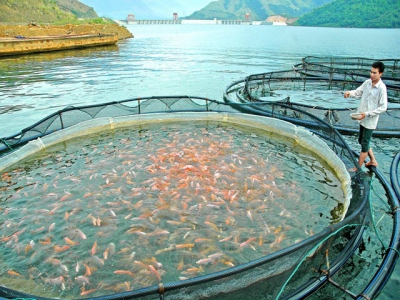High demand for fishery products attracts investment capital

Truong Dinh Hoe, secretary-general of the Vietnam Association of Seafood Exporters and Producers (VASEP), said global consumers increasingly appreciate seafood products due to their higher safety level. The increased demand for seafood is reflected in growing export turnover of Vietnamese seafood products.
Vietnam’s seafood exports reached US$7.05 billion in 2016, an increase of 7.31 percent compared to the previous year. This figure continued to increase by 18 percent in 2017, nearly 8.4 percent in 2018, and about five percent in the first quarter of 2019 compared to a year ago.
Vietnam’s shrimp and Tra fish exports have seen steady growth in the past few years, especially since the US exempted 31 Vietnamese shrimp exporters from anti-dumping tariffs following the 13th period of review (POR 13).
The country currently has more than 700 seafood processing enterprises, and most of them are still expanding and upgrading factories to meet production needs. Since the end of last year, many seafood processing projects in the Mekong Delta region have been licensed.
In the Mekong Delta province of An Giang, for example, the Asia Star Group worked with the provincial people’s committee in 2018 to formulate investment policy for cage aquaculture associated with ecotourism. In addition, the Nam Viet Joint Stock Company started the massive Nam Viet Binh Phu high-tech aquaculture project in Chau Phu District in early January this year, covering an area of 600ha with total investment of VND4 trillion.
In March 2019, the Can Tho People’s Committee granted an investment certificate to a joint venture between Japan’s Marine Foods Corporation and Nam Hai Exports Foodstuff Company Limited (VietFoods Co. Ltd). The joint venture will invest in building a seafood production and processing plant worth US$14 million in Tra Noc 1 Industrial Park in Can Tho City’s Binh Thuy District, with the plant expected to be put into operation in May 2020.
By 2020, seafood consumption is forecast to increase to 98.6 million tonnes in developing countries and 29.2 million tonnes in developed countries, while supply is estimated to reach only 78.6 million tonnes.
Related news
 CP’s RAS shrimp grow-out facility in China
CP’s RAS shrimp grow-out facility in China Thailand’s Charoen Pokphand Foods is building an indoor shrimp grow-out facility using recirculated aquaculture systems (RAS) in Shandong province.
 Pangasius fish price drops to ten year low
Pangasius fish price drops to ten year low The price of pangasius fish in the Mekong Delta has drastically fallen while slow consumption has posed a threat of oversupply and up inventory
 Increase the value of Vietnamese seafood to the EU
Increase the value of Vietnamese seafood to the EU On June 30, 2019 will create opportunities for deep access between Vietnam and the EU market of 28 member countries, in which seafood products